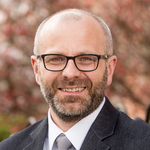By Dr. Gráinne Kearney, Dr. Michael K. Corman, and Prof. Gerry Gormley
Institutional ethnography (IE), with its complex sociological roots, might not seem the obvious choice for a practicing doctor undertaking a PhD in medical education. Indeed, those involved in Health Professions Education (HPE) could be forgiven for considering IE’s talk of ‘ontological shifts’ and ‘alternative sociologies’ as a far cry from the largely biomedical world of clinical practice and education.
Considered another way, however, clinicians, regardless of profession or specialty, are interested in the everyday lives and health work undertaken by themselves, their colleagues, and that of their patients, not to mention how illness plays out in people’s lives. This, we feel, is how and where IE’s approach to social scientific inquiry could be uniquely informative for clinical practice and education in health care.
I (Kearney) am a family physician, teacher to medical students, and in the final (grueling) months of my PhD in medical education. Three years ago, if someone had said ‘institutional ethnography’ to me I would have assumed they were trying to impress me with their knowledge of building regulations.
However, in the early months of my PhD, when I was trying to ‘figure out’ exactly what I was going to do for the following three years, I by chance attended a talk given broadly about qualitative research and more specifically about IE by Dr. Michael Corman in Queen’s University Belfast, before he returned to North America. His infectious enthusiasm for this approach to inquiry enticed me to stay behind after and following our enlightening chat, I came to find both an unconventional home in IE and an international collaborator, with whom our research team now have a number of publications.
This hasn’t been an easy journey, I have had to immerse myself in reading books and articles from a discipline that I have no grounding in, filling in the blanks along the way on an ad hoc basis, relying on the wisdom (via Skype) of Mike and other IE scholars. The more I read about IE as an alternative sociology, the more I realized how much I didn’t know, which was at times demoralizing and not good for my imposter syndrome status. I have also needed my very supportive supervisor (Prof. Gerry Gormley) to have blind faith in my infatuation with IE; his positive outlook, that we will get there eventually, seems to have won out! We decided early, as a supervisory team, that if I was going to seriously pursue this unorthodox route, I was going to need to learn it from the ‘horse’s mouth’, so to speak.
This is the point where I first mention the name of Dorothy Smith, the architect of this approach to inquiry. Anyone who knows me or has had the misfortunate to ask exactly what I was researching in my PhD, will be surprised that I have managed to hold this off until now. At the ripe age of 92 years, Dorothy Smith, a prominent feminist, is still at work today with IE. She gives a yearly intimate workshop, with the help of Dr Susan Turner to help researchers like myself to understand and continue this research tradition, under her very ‘direct’ guidance. I have been lucky enough to go twice to this workshop.
My (unhealthy) devotion to IE has led Mike, I, and my supervisory team, to wonder why IE hasn’t been taken up much in HPE research, in comparison to its use in front line clinical research such as into nurses1 or paramedics,2 to name a few. HPE has certainly embraced the many other critical qualitative methodologies that are bursting on the scene. Perhaps it is too complex? Too far from the more positivist leaning qualitative methods that are less of a stretch for those of us educated in a more positivist paradigm of biomedicine? Do its activist roots make the HPE world a little uncomfortable?
It seemed obvious to bring this dilemma up with Dorothy Smith herself, and she generously agreed to a ‘conversation’ with us, describing IE to HPE as a relatively new audience in her spontaneous and edifying way.3 Based on that, we felt that the HPE world was both ready and able for (and in our opinion obligated to hear) a broader discussion of what IE is and how we feel that this social scientific approach to discovery could inform HPE.
In our most recent article entitled, “Why institutional ethnography? Why now? Institutional ethnography in health professions education” (available at: https://doi.org/10.1007/s40037-019-0499-0) published in Perspectives on Medical Education,4 we discuss this very topic (we discuss this also in a podcast soon to be published with IGHPE). In this article, “we open a new dialogue in HPE by offering an opportunity to delve into institutional ethnography’s unique conceptual underpinnings.” We also discuss how we see IE contributing to HPE and provide some specific examples. We encourage health professions educators, researchers, and graduate students to read this article and begin their own conversation in how health professions research and education can be informed by the unique approach of institutional ethnography, especially in an age of continuous reform, restructuring, and accountability. As we write in the conclusion of this article:
‘We suggest that many cultural shifts are beginning to align which has brought institutional ethnography to the fore as an informative and potentially transformative approach to inquiry with which to tackle many of the social issues in HPE as suggested above. In a time of increasing pressures on frontline health workers with emphasis on ‘accountability’ and ‘competence,’ institutional ethnography offers informed resistance to neoliberalism, which having already infiltrated healthcare practice and the institutional settings in which that practice occurs, threatens much of what we do as health professions educators. Anyone interested in the various tenets of how social justice transpires in HPE should give institutional ethnography some informed consideration.’
References
- Rankin J, Campbell M. Managing to nurse: inside Canada’s healthcare reform. Toronto, ON: University of Toronto Press; 2006. 222 p.
- Corman MK. Paramedics on and off the streets: emergency medical services in the age of technological governance. Toronto, ON: University of Toronto Press; 2017. 219 p.3. Kearney GP, Corman MK, Gormley GJ, Hart ND, Johnston JL, Smith DE. Institutional Ethnography: a sociology of discovery—In conversation with Dorothy Smith. Soc Theory Health. 2018 [cited 2019 May 13];16:292–306. Available from: https://link.springer.com/article/10.1057/s41285-018-0077-2 doi: 10.1057/s41285-018-0077-2
- Kearney GP, Corman MK, Hart ND, Johnston JL, Gormley GJ. Why institutional ethnography? Why now? Institutional ethnography in health professions education. Perspect Med Educ. 2019 Feb [cited 2019 May 13];8(1):17-24. Available from: https://link.springer.com/article/10.1007/s40037-019-0499-0 doi: 10.1007/s40037-019-0499-0
Suggested Additional Readings
Campbell ML, Gregor FM. Mapping Social Relations: a primer in doing institutional ethnography. Walnut Creek, CA: AltaMira Press; 2002. 137 p.
Griffith AI, Smith DE. Under new public management: institutional ethnographies of changing frontline work. Toronto, ON: University of Toronto Press; 2014. 354 p.
Kearney GP, Johnston JL, Hart ND, Corman MK, Gormley GJ. Protocol: exploring the Objective Structured Clinical Examination (OSCE) using institutional ethnography. Int J Educ Res. 2018 March [cited 2019 May 13];88:42-47. Available from: https://www.sciencedirect.com/science/article/pii/S0883035517317536 doi: 10.1016/j.ijer.2018.01.002
Smith DE. Institutional ethnography: a sociology for people. Oxford, UK: AltaMira Press; 2005. 257 p.
Smith DE, editor. Institutional ethnography as practice. Lanham, MD: Rowman & Littlefield Publishers, Inc; 2006. 263 p.
Affiliations:
 Dr. Gráinne Kearney | Dr. Gráinne Kearney, MB MRCGP. PhD Candidate in Medical Education, Centre for Medical Education, Queen’s University Belfast, Northern Ireland |
 Dr. Michael Corman | Dr. Michael K. Corman, PhD. Assistant Professor, Sociology. The Department of Social, Cultural, and Media Studies, the University of the Fraser Valley, British Columbia, Canada. (Beginning August, 2019) |  Prof. Gerry Gormley | Professor Gerry Gormley, MD, FRCGP. Professor in Simulation and Clinical Skills, Centre for Medical Education, Queen’s University Belfast, Northern Ireland |

